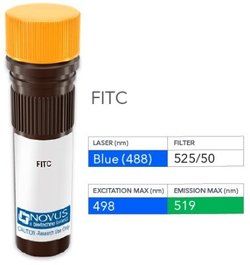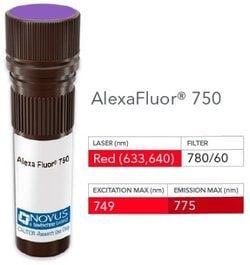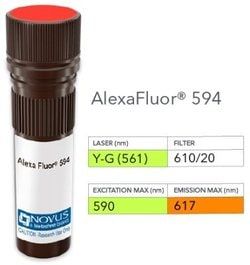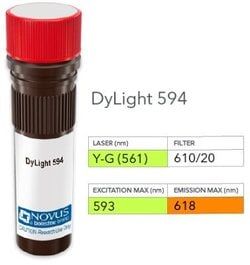Cytokeratin 18 Antibody (DC10), FITC, Novus Biologicals™
Manufacturer: Novus Biologicals
Select a Size
| Pack Size | SKU | Availability | Price |
|---|---|---|---|
| Each of 1 | NB005616-Each-of-1 | In Stock | ₹ 57,494.00 |
NB005616 - Each of 1
In Stock
Quantity
1
Base Price: ₹ 57,494.00
GST (18%): ₹ 10,348.92
Total Price: ₹ 67,842.92
Antigen
Cytokeratin 18
Classification
Monoclonal
Conjugate
FITC
Formulation
PBS with 0.05% Sodium Azide
Gene Symbols
KRT18
Immunogen
Human breast cancer PMC 42 cells were used as immunogen to generate the Keratin 18 antibody.
Quantity
0.1 mL
Research Discipline
Cancer, Cell Biology, Cellular Markers, Phospho Specific
Test Specificity
This monoclonal antibody reacts with a wide variety of simple epithelia. It does not react with stratified squamous epithelia. It reacts with epithelial tumors of the gastrointestinal tract, lung, breast, pancreas, ovary, and thyroid. Cytokeratin 18, which belongs to the type A (acidic) subfamily of low molecular weight keratins, exists in combination with cytokeratin 8. It is reported that tissues from gastrointestinal tract are positive for both cytokeratin 8 and 18 but do not contain cytokeratin 14. Tissues from gastrointestinal tract, respiratory tract and urogenital tract, as well as endocrine and exocrine tissues and mesothelial cells are positive for cytokeratin 18.
Content And Storage
Store at 4°C in the dark.
Applications
Flow Cytometry, ELISA, Immunohistochemistry, Immunocytochemistry, Immunofluorescence, Immunohistochemistry (Paraffin)
Clone
DC10
Dilution
Flow Cytometry, ELISA, Immunohistochemistry, Immunocytochemistry/Immunofluorescence, Immunohistochemistry-Paraffin, Immunohistochemistry-Frozen
Gene Alias
Cell proliferation-inducing gene 46 protein, cell proliferation-inducing protein 46, CK-18, CYK18, cytokeratin 18, cytokeratin-18, K18, keratin 18, keratin, type I cytoskeletal 18, keratin-18
Host Species
Mouse
Purification Method
Protein A or G purified
Regulatory Status
RUO
Primary or Secondary
Primary
Target Species
Human, Bovine (Negative), Canine (Negative), Hamster (Negative), Mouse (Negative), Porcine (Negative), Rat (Negative)
Isotype
IgG1 κ
Related Products
Description
- Cytokeratin 18 Monoclonal specifically detects Cytokeratin 18 in Human, Bovine (Negative), Canine (Negative), Hamster (Negative), Mouse (Negative), Porcine (Negative), Rat (Negative), Sheep (Negative) samples
- It is validated for Flow Cytometry, Immunohistochemistry, Immunocytochemistry/Immunofluorescence, Immunohistochemistry-Paraffin.




